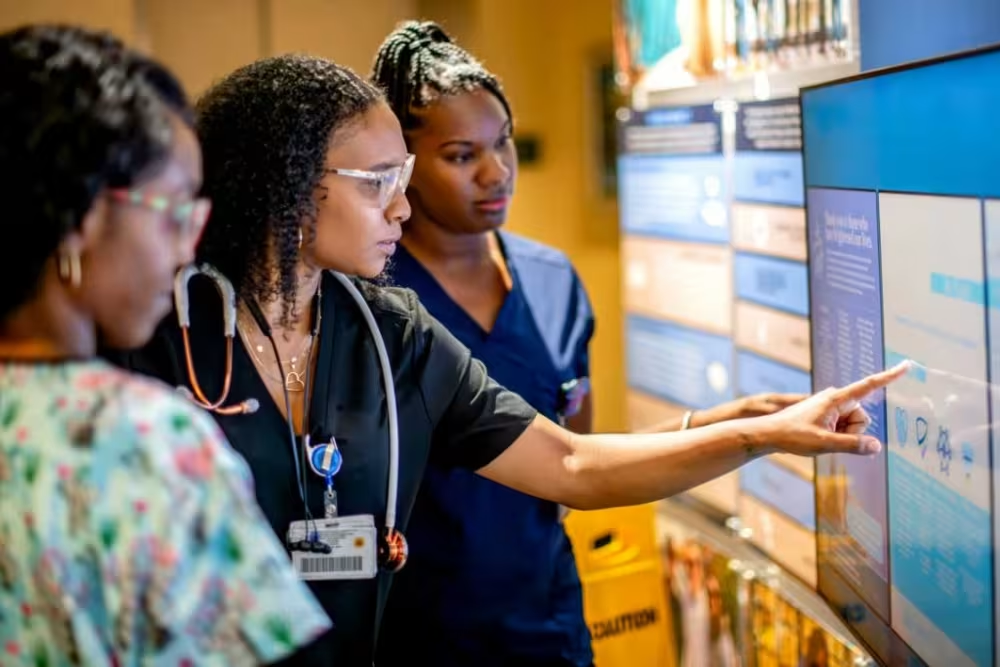Master’s in Nursing vs. Bachelor’s in Nursing: What’s the Difference?
Each blog post is dated and contains accurate information as of that date. Certain information may have changed since the blog post publication date. If you would like to confirm the current accuracy of blog information, please visit our ABSN overview page or contact admissions at (855) 830-2713.
Author Bio: Founded in 1947, The University of St. Thomas has helped many aspiring nurses on their path toward a successful career in nursing through its Accelerated Nursing Program in Houston, Texas.
The most apparent difference between a master’s in nursing vs. a bachelor’s in nursing is that the former is a graduate degree typically designed for already licensed, working nurses looking to advance their career. The latter is an undergraduate degree typically designed for students who want to become nurses.

With the ongoing nursing shortage in the U.S. and the projected job growth rate of 5 percent, it’s a great time to consider returning to school to earn a nursing degree. Start by comparing the differences and benefits of a master’s in nursing vs. a bachelor’s in nursing. Your educational background and where you are in your career will help establish your future career goals and your path to achievement.
Keep in mind that not all Bachelor of Science in Nursing (BSN) programs are the same. Some, like the University of St. Thomas’ (UST) Accelerated Bachelor of Science in Nursing (ABSN) program, allow you to earn a nursing degree in as few as 12 months instead of the four years that a traditional program takes.
Before choosing between a bachelor’s degree vs. a master’s degree in nursing, you’ll want to understand how each degree is designed. Look at the curriculum, academic timeline, and career path potential. Then, start planning your own career pathway.

What is an ABSN program? Learn all about it and find out if it could be right for you.
Understanding the Difference Between a Master’s and Bachelor’s in Nursing
The clearest difference between a master’s vs. a bachelor’s is that the former is a graduate degree, while the latter is an undergraduate degree. Most bachelor’s degree programs are designed for students with little to no prior college credits, such as those who have recently graduated from high school or are heading back to school after gaining workforce experience. In contrast, master’s degree programs are intended for those who already have a bachelor’s degree.
The BSN Degree
The Bachelor of Science in Nursing degree qualifies graduates to take the NCLEX in pursuit of a nursing career. You can expect the following from a BSN program.
Focus and Curriculum
Because most BSN degree programs are designed for individuals who aren’t yet nurses but would like to be, the curriculum has a broad scope. It teaches the fundamentals of nursing across various areas, such as adult health, pediatric health, community health, etc. Students participate in a blend of didactic courses and hands-on learning experiences.
The curriculum includes topics such as:
- Clinical leadership
- Health assessment
- Holistic nursing
- Pathophysiology
- Pharmacology
Academic Timeline
A traditional BSN degree program can be completed in four years of full-time study, including summer breaks. In contrast, the timeline of ABSN programs varies from school to school. The typical timeline is 16 months, but you can earn a BSN in as few as 12 months at UST.
“The timing is compressed. The content is not,” says Dr. Claudine Dufrene, executive director and associate professor of UST’s ABSN program. “Students receive the same degree, so they have to have the same outcomes, the same courses, the same number of hours through labs and simulation … within a year.”
Career Paths
A BSN degree allows you to take the NCLEX and obtain a state-issued RN license. This will enable you to pursue any entry-level RN jobs across a wide range of nursing specialties, such as:
- Family care
- Medical-surgical
- Orthopedics
- Pediatrics
- Urgent care
Discover the compelling reasons to choose a nursing school in Houston.

Advancement Opportunities
Many advancement opportunities are available to RNs without a master’s degree. After gaining clinical experience, you may decide to obtain one or more professional certifications in your nursing specialty. Some nursing specialties require clinical experience, such as home health nursing.
Another option is to pursue a leadership position that doesn’t require a graduate degree, such as a charge nurse. Earning experience as an RN can also lead to non-bedside roles, such as telehealth nursing or public health nursing. These roles often offer a weekly nine-to-five schedule, compared to the more variable shifts you see in a hospital. As your expertise grows, your BSN can support your changing lifestyle and career needs.
Earning Potential
While more highly educated nurses can expect to earn more, RNs with a BSN still have considerable earning potential. According to the U.S. Bureau of Labor Statistics (BLS), the median annual salary for nurses as of May 2024 was $93,600. Keep in mind that this is the median salary, not the average salary. Some nurses earned more than $135,320.
The MSN Degree
Some direct-entry MSN programs are designed for non-nurses with a bachelor’s degree in a field other than nursing who would like to switch careers to nursing. Most MSN programs, however, require candidates to hold a BSN degree and are intended for working nurses interested in career advancement.
Focus and Curriculum
Since the MSN is usually intended for working nurses, it focuses on advanced nursing topics and skills in a specialty area. Rather than providing a broad survey of nursing fundamentals, the nursing curriculum may explore topics in specialties such as:
- Adult-gerontology
- Family nursing
- Neonatal nursing
- Nursing administration
- Nursing education
- Nursing informatics
- Psychiatric mental health
Some of these specialty areas focus on clinical care, while others are intended to lead nurses toward careers away from the bedside.

Academic Timeline
Nurses who work through the MSN full-time may complete it in two to three years. Part-time students might need three to four years for completion. An MSN degree program is often available with online classes and in-person practicum experiences.
Advancement Opportunities
Advancement opportunities are plentiful for those holding an MSN. From there, you can earn a Doctor of Nursing Practice (DNP) degree and obtain the board certification and licensure necessary to become an Advanced Practice Registered Nurse (APRN), such as a nurse practitioner (NP) or certified registered nurse anesthetist (CRNA). You may also choose a role away from the bedside, such as nurse executive.
Another option is to earn a Doctor of Philosophy (PhD) instead of a DNP. This research-focused degree is ideal for those who would like to become nurse researchers.
Earning Potential
Salary ranges can vary by location and specialty, but according to the BLS, most APRNs earned a median annual salary of $132,050 as of May 2024.
Take the First Step Today With UST
After carefully weighing the differences between a master’s and a bachelor’s in nursing, you can see how earning a BSN is a solid first step toward your new career as a nurse. The University of St. Thomas’ ABSN program is ideal for students who have at least 60 college credits or a non-nursing bachelor’s degree.
While it’s a fast-paced program, students have support from Academic Success Coaches and individualized attention from instructors, thanks to our small class sizes. The most successful students are highly motivated.
“To be successful with the rigor of the program is truly a testament to them,” Dr. Dufrene says. “They want to go out and change the world.”
Get in touch with an admissions advisor today to learn more.
